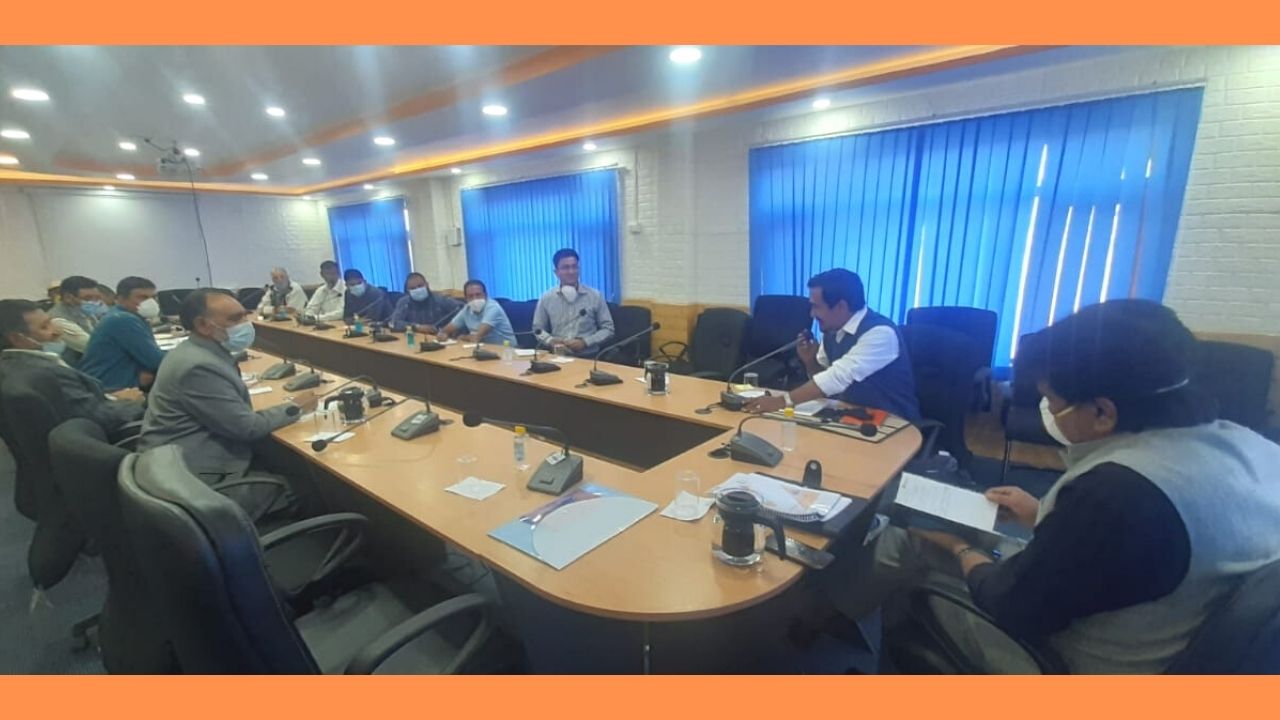Discusses technological interventions, possibilities for establishment of focused apricot based research center in Kargil
KARGIL SEPTEMBER 17, 2020: Chairman and Chief Executive Councillor LAHDC, Kargil Feroz Ahmad Khan in presence of the Executive Councillor for Agriculture Muhammad Ali Chandan convened a meeting with the visiting team of scientists from the Indian Council for Agricultural Research (ICAR) and the Central Institute of Temperate Horticulture (CITH) Srinagar at Council Secretariat here on Thursday.
Principal Scientist and In Charge Head, Division of Fruit Science, ICAR, CITH Srinagar Dr. Om Chand Sharma, Former Director Research, SKAUST (K) Shalimar Srinagar Dr. Muhammad Saleem Mir, Principal Scientist and Head, RRS, ICAR, Central Arid Zone Research Institute (CAZRI), Leh Dr. Anurag Saxena, Sr. Scientist and In Charge Mountain Agriculture Research & Extension, SKUAST (K) Kargil Dr. Faizan Ahmed, Scientist (Fruit Sciences), ICAR-CITH Srinagar Dr. Wasim Hassan Raja, F&AO, ICAR-CITH Srinagar Fayaz Ahmed Dar, Senior Scientist (SS) ICAR-CITH Srinagar Dr. Javid Iqbal Mir, District Horticulture Officer Ali Raza, Senior Scientist and In Charge KVK Kargil Dr. Muhammad Mehdi Akhone and Progressive Apricot Farmer Akhone Asgar Ali Basharat were present in the meeting.
The team of scientists from ICAR and the Central Institute of Temperate Horticulture Srinagar on the directions of Director ICAR-CITH Srinagar had called upon the CEC, LAHDC Kargil for finding possibilities of research support for apricot development in the district.
The meeting deliberated upon the need for research support for promotion, production and processing of apricot in the district.
The District Horticulture Officer Kargil and the scientists from Kargil presented the current status of apricot production in the district. They informed that currently India imports apricot and Kargil contributes to almost 50% of India’s apricot production.
Highlighting the nutritional value and application of apricot products in medicine and cosmetics industry, the scientists also apprised the visiting team about the potential of apricot in terms of its contribution to economy and local employment generation in light of the Prime Minister’s vision of Atma Nirbhar Bharat.
They stressed on the need for research support for augmentation of apricot in the form of establishment of a national research center and further underlined the importance of establishment of the same towards making the country self-sufficient in apricot production.
The scientists from Kargil also informed the visiting team that currently 60 villages in Kargil produce one or other variety of apricots. They said that out of 84 distinct species of apricot, currently almost 18 to 20 apricot varieties are grown in the district with Gargardoo village producing the finest quality apricots. They also highlighted various issues currently being faced in apricot farming viz a viz the limitations of traditional farming, lack of marketing opportunities, ban on export of fresh apricot and the issue of codling moth etc. They said that a research institute with specific focus on apricot can cater to the needs of the entire Union Territory of Ladakh.
Meanwhile, the CEC Kargil expressed gratitude to the team for visiting Kargil for initiating necessary deliberations and technological interventions for apricot promotion in the district. He said that if the right kind of intervention is made timely, the apricot industry in Kargil can be developed easily on the pattern of the apple industry of Kashmir further adding that apple farming in Kashmir was revolutionised by the introduction of various modern technological interventions.
CEC Khan stated that due research support can help the government to look towards improving the livelihood of the common populace and strengthen the economy in the most sustainable manner. He said that the research support is must to establish a robust mechanism for alternative livelihood in view of the increasing population and the insecurities attached with the kind of non-sustainable economy models.
EC Agriculture Muhammad Ali Chandan stressed on the need to review the current apricot farming from traditional methods by introducing technological interventions with due government collaboration. He stated that if timely actions are not taken in this regard, the increasing population and fragmentation of farming lands may push apricot production towards extinction. Timely interventions can boost up the production of this golden fruit he stated further adding that research support can help in expansion of apricot growing areas. Introduction of high density varieties can further boost up apricot production in the district and Kargil can be easily promoted as the apricot bowl of India.
Meanwhile, the team of scientists informed the CEC about the specifications required for establishment of various research institutes. They deliberated upon and enquired about the current issues in apricot farming and also threw light on governmental norms and the commitment of the ICAR towards finding possibilities of research support for apricot promotion in Kargil.
Former Director Dr Saleem Mir informed the meeting about the concept of having a centre of excellence aimed towards targeted research in apricot farming.
The visiting team deliberated upon the feasibility for establishment of a National Research Center, Regional Station, Center of Excellence, upgradation/strengthening of existing research centres like KVK/SKUAST etc and also asked the District Horticulture Officer to submit more statistics in this regard.
They stated that the importance of promotion of apricot farming and the need for research support was paramount for the ICAR-CITH and that they have come to Kargil with specific directions from the Director ICAR-CITH towards finding all possibilities towards achieving this goal.

 हिंदी
हिंदी






